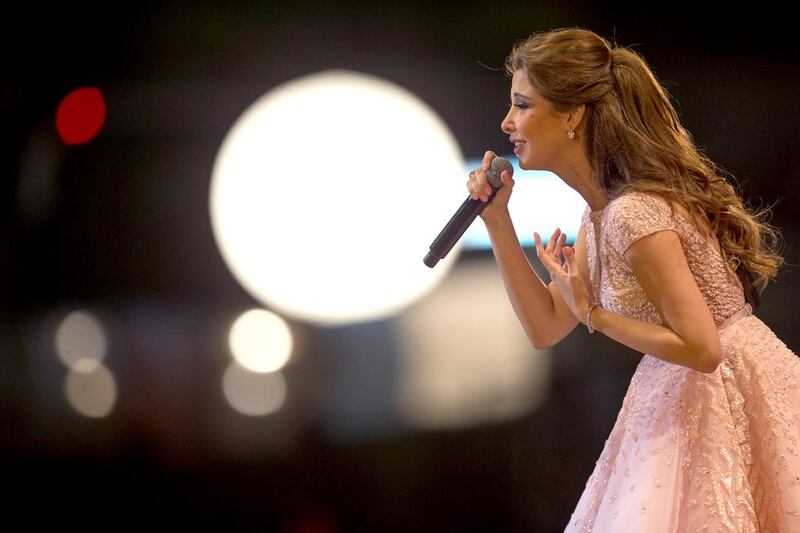Arts&Life kicks off a series of eight interviews featuring musicians and singers from the recently held Mawazine Festival in Morocco. This week, Nancy Ajram tells us about her soaring career trajectory and the criticism she has faced.
Nearly 15 years into her career, Nancy Ajram's star continues to rise. Ever since she made her debut with her effervescent 2003 single Akhasmak Ah, the Lebanese singer and Arab Idol judge has grown to become one of the region's biggest pop stars, with more than 20 million albums sold.
Despite her perceived diva status, part of Ajram’s appeal is her down-to-earth charm. Ajram, now 31, may not be known for angry outbursts and on-screen meltdowns, but beneath that gentle smile lies an artist who is sure of herself and willing to stare down the critics.
You recently won a World Music Award for Best Selling Arab Artist. How does it stack up against those you’ve won in the region?
I have been blessed to win many awards and the World Music Award was a big thing for me. But to me, the biggest award is to see the joy of people in the concert, especially those who don’t know Arabic. Not long ago, I performed in France and to see the French enjoying the song was gratifying. I guess that as a singer, what you are looking for the most is a sense of connection with the audience. And that is an amazing feeling.
You business relationship with your manager Jiji Lamarra is one the most successful partnerships in the Arab music industry. How big a role does he play in your creative process?
Jiji knows when a song delivered through me could come across as beautiful or powerful. But, at the same time, the song has to connect with me. I think that if a song is written well and performed to perfection, it won’t have the right effect if the singer doesn’t feel it in their heart.
You are one of those rare singers who has not fully taken to films yet. Is acting something you might consider in the future, however?
I don’t see it that way – acting is something that must come naturally. For me to get involved in it is similar to learning a new craft. I need to study it and approach it with the respect it deserves. Right now, it is music that has been taking most of my time. I will not say never to doing films, but perhaps in the future, once I have the time to find the right project and the right people.
When it comes to television, you recently finished your first season as a judge on Arab Idol. Your role on the panel was criticised because your comments were seen as lacking bite or not direct enough. Would you say there is truth in those observations?
I think those who say that have not watched the show or perhaps watched it but didn't listen. I didn't get to where I am now with ease. Before I released my first single, Akhasmak Ah, I studied music for nearly 10 years, including composition on the oud, vocalism and music theory. So the people who make these claims about my comments on the show are wrong. If they truly followed the show they would also realise I make comments about the performance in terms of the song, its modes and arrangements. I came to this show to help and not say "You have a great voice" and "I love your hair and make-up".
You have released two albums dedicated to children. What made you take that route?
The children’s albums are very important for me. They are not a side thing at all. I do it as it is my opportunity to put a smile on their faces and to give them something that they can enjoy. Child-friendly albums are something I have wanted to do since I began my career. Now, it’s the kids who encourage me to do more of it. When I see them singing along, it really is a motivating factor. I love it.
You are viewed internationally as one of the leading singers from the Arab world. Are you considering going global? Will you make an album collaborating with non-Arab artists?
I am currently reviewing a song someone presented to me for my new album. It’s not in Arabic; I have to see if it will suit me. I am open to trying different styles but if I do sing in another language it may be French because I adore that language.
• Next week on Mawazine Sessions: IAM, the French hip-hop collective with a penchant for Egyptian imagery and beats
sasaeed@thenational.ae






